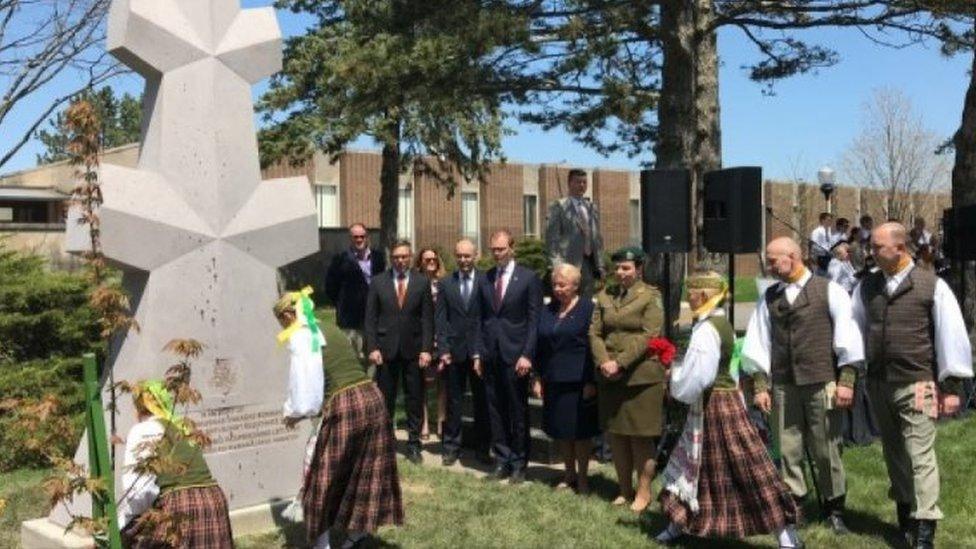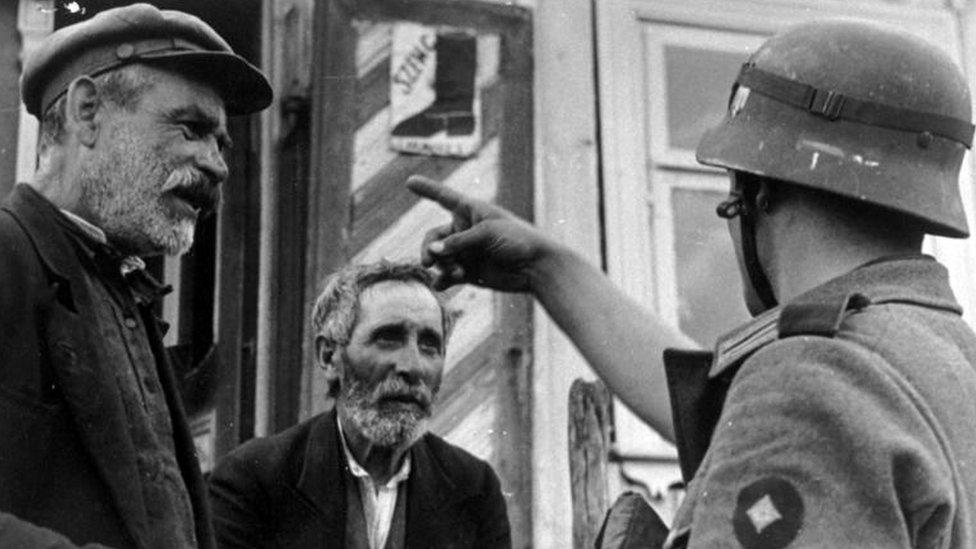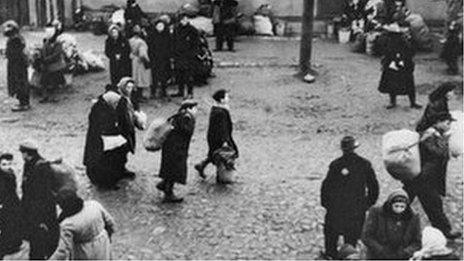Lithuania monument for 'Nazi collaborator' prompts diplomatic row
- Published

Family members as well as Lithuania's foreign minister attended the unveiling in the US on Sunday
A monument to a Lithuanian hero in the US city of Chicago has prompted a row over World War Two after criticism from Russia and the Simon Wiesenthal Center.
Adolfas Ramanauskas-Vanagas commanded Lithuania's resistance to Soviet occupation after World War Two.
But the Simon Wiesenthal Center, which researches the Holocaust, says he also led a vigilante gang that persecuted Jews after the 1941 Nazi invasion.
Lithuania has accused Russia of making false statements.
The foreign ministry said on Tuesday it had summoned the Russian embassy representative in Vilnius in protest and called on Moscow to stop spreading disinformation about Ramanauskas's "impeccable reputation".
It has also accused the Simon Wiesenthal Center of making false accusations.
But Efraim Zuroff, the Center's head in Jerusalem, said that Lithuania had to confront its history. "They're not telling the people the truth and they're not facing the truth," he told the BBC.
Allow X content?
This article contains content provided by X. We ask for your permission before anything is loaded, as they may be using cookies and other technologies. You may want to read X’s cookie policy, external and privacy policy, external before accepting. To view this content choose ‘accept and continue’.

Lithuanian Foreign Minister Linas Linkevicius attended an unveiling ceremony on Sunday in Chicago, the hub of the Lithuanian community in the US, alongside Ramanauskas's daughter and granddaughter.
Who was Ramanauskas?
Known as "the hawk", Adolfas Ramanauskas-Vanagas was a vigilante leader in the early days of the Nazi invasion of Lithuania in June 1941.
The Soviets had occupied the country in 1940 and it is his role during those initial weeks of Nazi occupation that is in question.
Some 220,000 Jews were living in Lithuania when the Nazis invaded. The Simon Wiesenthal Center says that during that time Ramanauskas led a gang of vigilantes that persecuted the Jewish community of Druskininkai and that he even mentioned it in his memoirs.
There is no evidence that he had personal involvement in murder and the Lithuanian government insists instead that he ran a "property protection unit", active from 23 June to 7 July 1941, that merely guarded homes and shops and did not target Jews.
A Nazi ghetto opened at Druskininkai in July 1941 and within months there were only 40,000 Jews alive in Lithuania.
Ramanauskas went on to become a national hero after the Nazis were defeated and the Soviet occupation returned in 1944.
Allow X content?
This article contains content provided by X. We ask for your permission before anything is loaded, as they may be using cookies and other technologies. You may want to read X’s cookie policy, external and privacy policy, external before accepting. To view this content choose ‘accept and continue’.

He joined the fight for independence and became head of the freedom fighters before his capture by the Soviets and his execution in 1957. His remains were eventually found in a Vilnius cemetery last year and he was given a hero's burial.
How did the row unfold?
The Russian embassy in the US protested against the erection of the monument, condemning it as "especially cynical" as it almost coincided with Holocaust Remembrance Day and came shortly before Victory in Europe Day.
In a Facebook post, external, it accused Lithuania of setting up its Genocide and Resistance Research Centre to "justify" the role of the resistance group, which the embassy called the Lithuanian Activist Front and accused of "massacring and pillaging the Jews and the Poles before the German forces entered Lithuania in 1941".
The Lithuanian foreign ministry reacted furiously on Tuesday, external, saying: "You will not drag us down to your level." It said the group, the Lithuanian Freedom Fighters, had resisted Soviet occupation from 1944-53.
It added that it was also very disappointed by the Wiesenthal Center's statement.
What does Wiesenthal Center say?
Mr Zuroff said there was no evidence that Ramanauskas had killed anybody but, he told the BBC, he had written "in his memoirs how he headed this band of vigilantes".
He said Lithuania's handling of the issue was an outrage.
"This was a critical period when vigilante gangs were roaming the streets in many places and Jews were attacked in over 40 places before the Nazis showed their face," he said.

Only 4% of Lithuania's Jewish population survived the Nazis
Efraim Zuroff also cited the case of Lithuanian Nazi collaborator Jonas Noreika, a national hero who was executed by the Soviets.
Noreika, also known as General Storm. was eventually outed as a Nazi collaborator who had done "monstrous things" by his granddaughter, Silvia Foti.
Ms Foti told the BBC earlier this year how she had first come across a 32-page anti-Semitic pamphlet he had written and then found documents signed by Noreika asking for Jews to be sent to a ghetto. She also found he had stolen Jewish property.
Listen here: Find out more about Silvia Foti and her "hero" grandfather
Mr Zuroff complained that he had met MPs in Lithuanian's parliament, the Seimas, in 2017 to explain his concerns. "They were determined to honour him - it didn't matter he helped persecute Jews: that didn't seem to bother them."
Lithuania's Genocide and Resistance Research Centre told the BBC that Ramanauskas had never collaborated with the Nazis, but lies about him had been spread first by the Soviet-era KGB secret police to discredit him.
It quoted a 1952 diary entry by Ramanauskas in 1952:
Soviet occupants called us "German Nationalists". They used this term in order to discredit us inside the country and abroad - hoping that perhaps some people will believe that we were fighting for Nazi affairs, at the same time betraying our homeland".
- Published17 May 2012
